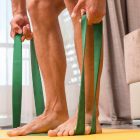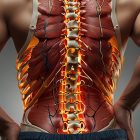A stiff neck is when you want to turn the head to the side, but you experience difficulty moving the neck. Headache, Neck Pain, shoulder pain and arm pain may also be associated with it. In the end, a person may have to turn the whole body instead of the stiff neck to look sideways or across the shoulders.
The pain and discomfort of one stiff neck appears to most people after waking up one morning or maybe after a day of hard work, like moving furniture. Pain and rigidity naturally disappear within a week. In most cases, how a person treats and looks after the stiff neck symptoms can affect pain, recovery time, and the chance of a return.
Causes of stiff neck
Any activity which places your neck in an uncomfortable position for a long time could make your neck muscles tired and spasmic. For instance, it may cause neck stiffness if you hold your phone up against your shoulder while talking, sleep at a disturbing angle with your neck, carry a large sack on one shoulder, or look down or up too far to view your PC or TV. Excessive stress or anxiety can also lead to neck tension.
If the symptoms begin immediately, such as falling off stairs or at any event, the cause of the stiff neck may be apparent.
But it could be challenging to determine the exact cause if a stiff neck seems to develop out of nowhere.
Some uncommon causes of the stiff neck are:
Cervical herniated disc: The protective external part of a disc in the cervical spine is broken down. The inner part leaks out, which causes compression and inflammation in nearby tissues.
Cervical degenerative disc: As discs lose their moisture and height over time, pressure increases on close connections, nerves, and soft tissues such as ligaments and muscles. This can lead to pain and rigidity in the neck.
Cervical osteoarthritis: Arthritis of cervical faction joints often occurs between spinal and anatomical changes, such as bone spurs, along with other degenerative conditions, such as back stenosis.
Symptoms of stiff neck
An intense stiff neck can vary from an annoying inconvenience to extremely painful, acute and restrictive. Typically, you must stop the movement if you are trying to turn a stiff neck to a particular side or direction.
The amount of decreased neck movement can affect the activity levels of the person. For instance, if it is impossible to turn the head considerably in one direction without pain, you should avoid driving until symptoms improve.
Treatment and consultation
It’s often easy to take it for a day or two to give the neck’s soft tissues a healing opportunity. In cases of significant pain, a patient may be interested in using a standardised pain medicine or applying ice or therapy.
It is not advised to wear a cervical neck to stabilise a stiff neck. Instead, if possible, a person with a stiff neck would try to keep to normal activity levels, especially after day one or two.
If, after a week, a stiff neck did not improve, visit a doctor. An explicit medical practitioner like Orthocure, one of the best neck pain treatment clinics in Gurgaon, provides a complete 360-degree approach to tackle every aspect of your stiff neck problem.





